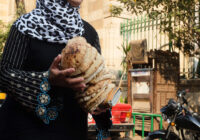In the UAE, a young woman has been imprisoned and tortured since 2015, but no one has heard about her.
As the world’s media has once again picked up on the story of Saudi Crown Prince Mohammed bin Salman’s involvement in the brutal murder of journalist Jamal Khashoggi, another story is receiving scant attention.
Alya Abdulnoor is a young Emirati woman who was arrested in July 2015 and eventually charged with financing international terrorist groups, though the only evidence presented was a record of websites she had visited. Abdulnoor was not politically active; she was concerned about the impact of the civil war in Syria on women and children and had been collecting donations on their behalf.
When she was arrested, Abdulnoor was already suffering from cancer. She was detained in an unknown place for four months, according to the Geneva-based International Centre for Justice and Human Rights (ICJHR). She was subjected to torture and forced to sign a false confession that was used to convict her. This is standard practice in the United Arab Emirates; it was used against the acclaimed human rights activist Ahmed Mansoor and the noted academic Nasser bin Ghaith, as well as dozens of other political prisoners.
In May 2018, a voice recording was smuggled out of Al Wathba prison, in the Emirati capital Abu Dhabi, and given to the ICJHR. In it, Abdulnoor detailed how she was exposed to torture, continuously intimidated and deprived of adequate medical care. Even though she was diagnosed with a recurrence of cancer shortly after her arrest, for several years the authorities did nothing to alleviate or treat the disease. She was eventually moved to a specialist hospital, but only after the cancer had spread throughout her body and she was unable to stand or walk without assistance.
On January 10, the ICJHR reports, Abdulnoor was moved against medical advice to a non-specialist hospital. When her family was able to visit her on January 21, she was under heavy guard in a windowless room without ventilation. She was chained to her bed.
The family has repeatedly requested that she be allowed home to die, citing federal legislation that allows such a practice, but the authorities have rejected all their requests. The family believes the move to the second hospital and the appalling treatment she is being subjected to is a punishment for their efforts.
The ICJHR notes: “Alya Abdulnoor is still denied basic hygiene care and adequate medical attention despite her critical condition now that cancer has reached her brain, her liver, lungs and her bones, making her pain unbearable. Despite the repeated requests of the family, the [Emirati] authorities are still refusing to deliver a medical report on Alya’s current state of health.”
Let Her Go Home
Stop for a moment and think about what the authorities in a country that Britain is happy to call a good friend and ally are doing to a dying woman and her family. It is extraordinarily cruel and happens only because the crown prince and effective ruler of the UAE — Mohammed bin Zayed — believes that, like his Saudi counterpart, he can behave with impunity, emboldened by the certainty that we will raise no objections. He is able to conduct his inhumane business in the shadows.
The Abu Dhabi crown prince has also largely escaped global criticism for the conduct of the UAE in Yemen, unlike Mohammed bin Salman, who is rightly held responsible for an aerial war that has killed tens of thousands of civilians. However, the Emiratis, too, have much to answer for. Among other charges, they stand accused of carrying out mass torture, including rape in clandestine prisons set up by them in the south of Yemen. Yet that has had far too little international exposure and condemnation.
Alistair Burt, the UK’s minister of state for the Middle East, has a warm relationship with the UAE’s minister of state for foreign affairs, Anwar Gargash. Writing in an Emirati newspaper in 2017, Burt had this to say about their relationship: “It would be wrong to suggest that we see eye-to-eye on everything, but the depth of the relationship means that serious questions can be raised without fear, and positions better understood to mutual benefit.”
Minister, I ask you now and as a matter of extreme urgency to raise the case of Alya Abdulnoor with your Emirati counterpart. Tell Dr. Gargash to allow her to go home to die.
*[This article was originally published by Middle East Monitor.]
The views expressed in this article are the author’s own and do not necessarily reflect Fair Observer’s editorial policy.
Support Fair Observer
We rely on your support for our independence, diversity and quality.
For more than 10 years, Fair Observer has been free, fair and independent. No billionaire owns us, no advertisers control us. We are a reader-supported nonprofit. Unlike many other publications, we keep our content free for readers regardless of where they live or whether they can afford to pay. We have no paywalls and no ads.
In the post-truth era of fake news, echo chambers and filter bubbles, we publish a plurality of perspectives from around the world. Anyone can publish with us, but everyone goes through a rigorous editorial process. So, you get fact-checked, well-reasoned content instead of noise.
We publish 2,500+ voices from 90+ countries. We also conduct education and training programs
on subjects ranging from digital media and journalism to writing and critical thinking. This
doesn’t come cheap. Servers, editors, trainers and web developers cost
money.
Please consider supporting us on a regular basis as a recurring donor or a
sustaining member.
Will you support FO’s journalism?
We rely on your support for our independence, diversity and quality.






